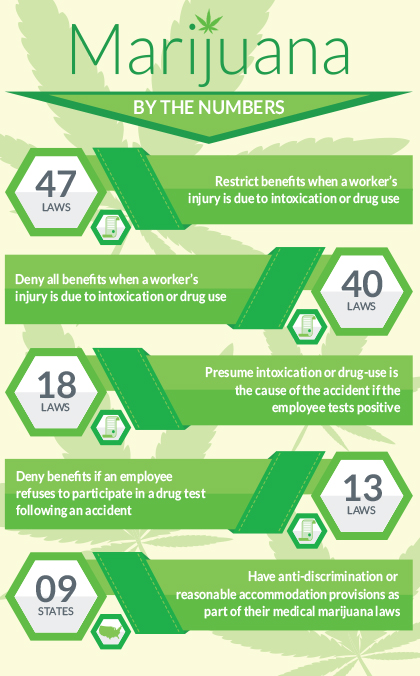An article emphasizing the many questions employers have relating to marijuana use has been published by the National Council on Compensation Insurance (NCCI). The article, “The Marijuana Conversation: Questions Employers Are Asking” is the second in a five-part series examining the issues surrounding the growing impact of legalizing marijuana on workers’ compensation stakeholders.
The first article in the series, The Marijuana Conversation: Questions Workers’ Compensation Insurers Are Asking, focused on the insurance carrier perspective.
The NCCI article outlines three main questions.
What is the impact on workers’ comp when an employee is injured on the job while under the influence of marijuana?
The impact on workplace safety and workers’ comp is foremost on employers’ minds.
“The majority of jurisdictions (47) have workers’ compensation laws that address this issue and, in some form, restrict workers compensation benefits when a worker’s injury is attributed to intoxication or drug use. Of those, 40 states are able to completely deny all benefits (100% of medical and income benefits) and a handful of states deny income benefits, but allow injured employees to receive medical benefits,” wrote the NCCI authors.

In addition, according to the article, some states allow benefit reduction if intoxication or drug use can be proven. Many of the states allow employees to rebut any presumption that drug or alcohol use played a role in an injury. Some states allow benefits to be denied if employees refuse drug or alcohol testing.
The questions of what constitutes impairment resulting from marijuana use and how to determine if an injured worker was impaired at the time of injury are still up in the air. The authors point out that marijuana can remain in a worker’s system for a period of time, which makes determining impairment at the time of injury more difficult.
How can employers administer a drug-free workplace and establish hiring practices when employers are legally able to use medical marijuana?
Employers are unsure how to handle a drug-free work environment amid some states’ legalization of medical marijuana. According to the article questions employers have include:
- Does an employee’s legal use of medical marijuana impact whether an employer must allow use of the drug in the workplace?
- What are the implications if the employee’s medical marijuana use is to treat a work-related condition?
So far, no states have placed restrictions on drug-free workplace policies.
Has there been any recent state activity that could complicate matters for employers in determining how to handle the marijuana issue?
Even though no state has restricted drug-free workplaces, the article noted that nine states (Arizona, Connecticut, Delaware, Illinois, Maine, Minnesota, Nevada, New York and Rhode Island) have anti-discrimination or reasonable accommodation provisions as part of their medical marijuana laws that may impact how employers enforce such policies. These could affect how employers address marijuana use.
Two state court decisions reveal “the complexity of the relationship between marijuana and the workplace.” According to the article, “In July 2017, Massachusetts’ highest court ruled that an employee who was terminated after testing positive for marijuana could proceed with a claim against her employer based on the state’s disability discrimination statute. Then, one month later, in August 2017, a Connecticut federal district court ruled that a job applicant could bring a lawsuit against her potential employer for discrimination under Connecticut’s medical marijuana law when the employer rescinded a job offer based on the applicant’s positive drug test for marijuana during the pre-employment drug screening.”
The next edition of The Marijuana Conversation will focus on questions employees are asking.
Source: NCCI
Was this article valuable?
Here are more articles you may enjoy.

 Stellantis Weighs Using China EV Tech for Affordable Cars
Stellantis Weighs Using China EV Tech for Affordable Cars  Building Fortification And The Role of The Insurance Industry
Building Fortification And The Role of The Insurance Industry  Claims Handling Breakdowns From LA Wildfires One Year on
Claims Handling Breakdowns From LA Wildfires One Year on  Walmart to Pay $100 Million to Settle FTC Case on Driver Wages
Walmart to Pay $100 Million to Settle FTC Case on Driver Wages 